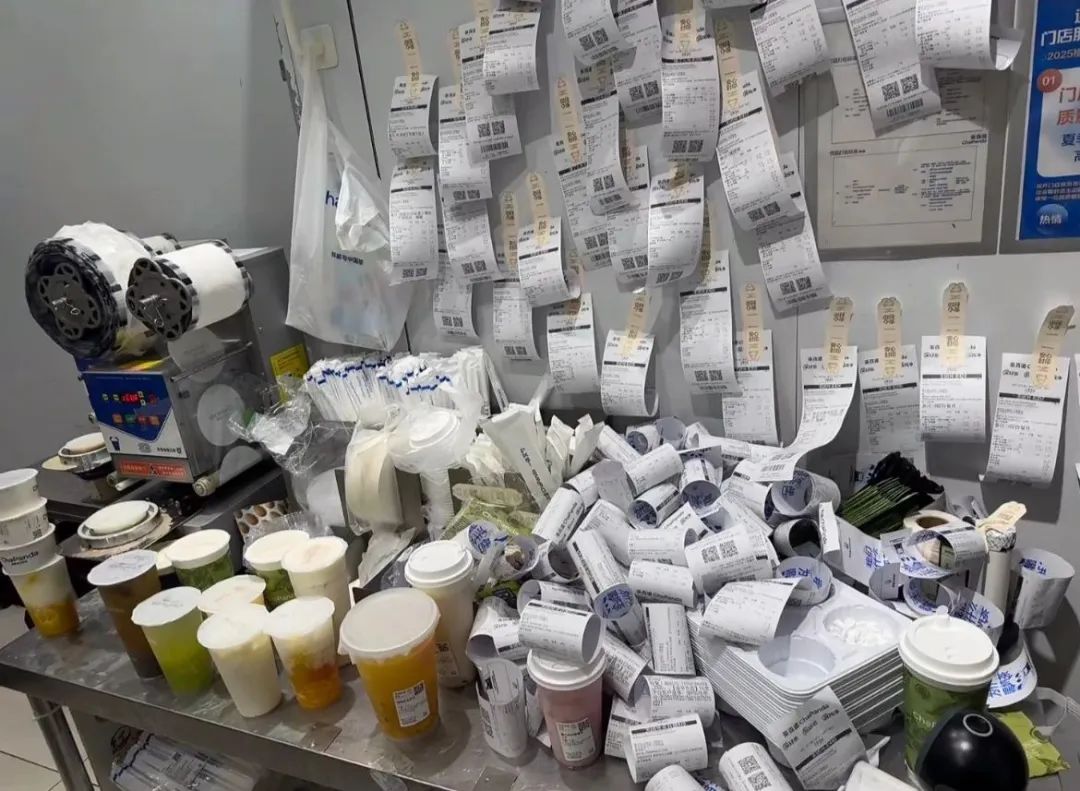
Milk tea shop orders during the food delivery war. Photo/ Xiaohongshu App
AsianFin -- China’s food delivery sector is experiencing a surge in order volumes not seen before, but behind the headline growth lies a heated price war that risks destabilizing the entire industry.
Daily orders in the instant retail and food delivery market have soared to 250 million—more than double the 100 million recorded at the start of the year—driven by aggressive subsidies from tech giants JD.com and Alibaba. Together, the two firms have pledged 80 billion yuan ($11 billion) in discounts, igniting the largest subsidy war in the history of China’s internet economy. Meituan, the market leader, has been forced to join the battle to defend its dominance.
In 2024, Meituan maintained a steady 70 million daily orders, while Taobao Flash Delivery and Ele.me hovered just above 20 million. Today, those numbers have been dwarfed by a new phase of competition that industry leaders warn is unsustainable.
A Bubble Built on Burning Cash
“This is just a bubble,” said Meituan’s Core Local Commerce CEO Wang Puzhong in a recent interview with LatePost. “Subsidies can shift pricing, but they don’t change overall consumption.” Wang emphasized that the surge in order volume has done little to attract new users, calling for the industry to return to rational competition.
Indeed, much of the order growth is attributed to zero-cost promotions and price slashing rather than genuine demand. Orders for items like milk tea have spiked due to subsidies, but these transactions often offer no profit to merchants and erode platform margins.
On July 18, China’s State Administration for Market Regulation summoned representatives from Meituan, JD.com, and Ele.me, demanding stricter compliance with e-commerce laws and calling for fair competition. It was the second such regulatory meeting since May, but this time the tone was sharper, signaling growing official discomfort with the sector’s trajectory.
The scale of spending is staggering. The 80 billion yuan pledged to subsidize delivery orders represents more than 12% of China’s annual equity investment in the primary market, according to Zero2IPO. That figure rivals the yearly funding totals of entire strategic industries such as semiconductors or biotech.
Analysts say the strategy reflects desperation for growth. As traditional e-commerce traffic plateaus, giants like JD.com and Alibaba are shifting their focus to food delivery—one of the few remaining entry points for daily consumer engagement.

But this is unfamiliar territory. With operating margins of just 4%, food delivery is a thin-margin business dependent on scale and precision. “If there’s even a slight deviation, you lose money,” Wang said.
Despite the dramatic rise in orders, Meituan still controls around 70% of the market, with 130 million daily orders—even excluding self-pickup and zero-cost deliveries. Taobao Flash Delivery trails with 80 million, and JD Delivery follows at 25 million. The balance of power has shifted little, suggesting that the subsidy war is redistributing existing demand rather than unlocking new growth.
Meituan, known for its logistical efficiency, has spent far less than its rivals in the latest price battles. On July 12, Meituan’s estimated subsidy outlay was 300–400 million yuan, compared to Alibaba’s 1.2 billion, according to Jiemian News.
Still, Meituan was compelled to respond. “You hurt the enemy by 800, but you hurt yourself by 1,000,” said Wang, describing the nature of the ongoing battle. He noted that price-sensitive users are fickle, often shifting platforms without long-term loyalty.
A Call for Rationality
The war is taking its toll. iiMedia Research estimates that China’s food delivery market will reach 1.64 trillion yuan in 2024, up 7.2% from the previous year—but that growth is far slower than the 36.7% seen in 2023. As the market matures, stakeholders are demanding a reset.
Consumers want better quality and healthier options. Couriers seek better protections and wages. Merchants need sustainable profit models. Yet the average order value has dropped, squeezed by discounts that now undercut dine-in prices.
In cities like Suqian, where JD.com is running heavy subsidies, restaurants are seeing delivery orders skyrocket—but dine-in traffic has collapsed. These ultra-low-priced orders have brought little to no long-term value, and in some cases, may be distorting consumption behavior.
For e-commerce giants, the cost-benefit equation is also deteriorating. In 2024, the entire industry generated 30 billion yuan in profit, with platforms earning just over one yuan per order. Most of the much-criticized 20% commission actually consists of delivery fees passed on to couriers, and technology fees averaging less than 8%.
Despite years of investment, Meituan’s returns remain modest. “This isn’t a business that rewards draining the pond to catch the fish,” said one analyst. “It requires careful balance across the entire ecosystem.”
In May, five government ministries jointly summoned leading platforms to warn against disorderly competition. Meituan responded by dialing back promotional tools and capping discounts. The platform says merchant subsidies fell by 15%, while delivery efficiency improved by 20%.
Now, regulators are demanding more. The July 18 meeting emphasized the need for platforms to rein in predatory pricing and promote a healthier environment for users, couriers, merchants, and the platforms themselves.
The Endgame: Who Survives the Burn?
As the subsidy bubble nears its breaking point, companies that have burned through billions with no clear ROI risk being left behind. Meanwhile, the restaurant and food delivery industries—many of them dependent on thin margins and stable operations—are bearing the brunt.
At its core, the subsidy war reflects a broader malaise: China’s internet giants, facing a post-growth era, are falling back on the familiar tactic of burning cash to fight for stock market share, rather than innovating for future growth.
The companies that endure may not be the ones spending the most, but those willing to do the hard work—optimizing logistics, refining product offerings, and building loyalty in a low-margin business.
更多精彩内容,关注钛媒体微信号(ID:taimeiti),或者下载钛媒体App

